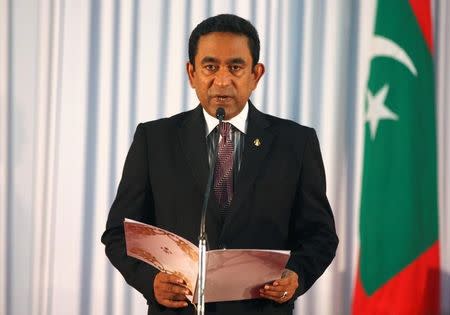Maldives leader seeks approval to extend state of emergency

By Mohamed Junayd
MALE (Reuters) - Maldives President Abdulla Yameen on Monday sought parliamentary approval to extend a state of emergency by 30 days, saying a threat to national security had not diminished and a constitutional crisis had not been resolved.
Yameen imposed a state of emergency on Feb. 5 for 15 days to annul a Supreme Court ruling that quashed convictions against nine opposition leaders and ordered his government to free those held in prison. The state of emergency was to end on Tuesday.
The opposition said the move needed a quorum of at least 43 MPs in the 85-member parliament. No opposition MPs showed up for Monday's session, leaving only 39 present from the ruling party.
In a ruling earlier this month, the high court ordered the reinstatement of 12 lawmakers stripped of their parliamentary seats by Yameen's party for defecting last year. Without the 12 MPs, the government retains a majority in parliament.
Monday's parliament sitting came a day after the Supreme Court ruled there must be a delay in reinstating the 12 MPs.
Under the emergency, Yameen's administration has arrested the chief justice, another Supreme Court judge and former president Maumoon Abdul Gayoom on allegations of attempting to overthrow the government.
Ruling and opposition party leaders clashed over whether parliament's approval was required to extend the state of emergency under the constitution.
"If the opposition wants to annul this declaration, they have to go to the parliament and ask for a vote," ruling party group leader in parliament Ahmed Nihan said. "The ... emergency does not become void because parliament does not approve it."
Ibrahim Mohamed Solih, opposition parliamentary group leader, said the constitution "clearly states" parliament's indispensable role in extending an emergency.
"If this is not approved (by parliament), it is going to be invalid. Once the emergency becomes void everything done under that state of emergency also will be void and invalid."
A statement from the president's office said disengagement of opposition legislators would cripple the parliament’s ability to decide on the emergency. "Further, the government notes with concern that these actions will further deepen the current constitutional crisis," it said.
Though Yameen has ignored the court rulings, he has stopped short of saying he will not obey them. He has fired two police chiefs who said they would uphold the court verdict, however, and continues to jail opposition members.
China, India, the United States and Britain issued travel warnings after Yameen imposed the state of emergency and arrested judges. The United Nations has urged Male to lift the emergency. The Indian Ocean island chain is best known for its luxury hotels, scuba-diving resorts and tropical seas.
(Writing by Shihar Aneez; Editing by Mark Heinrich and Janet Lawrence)

